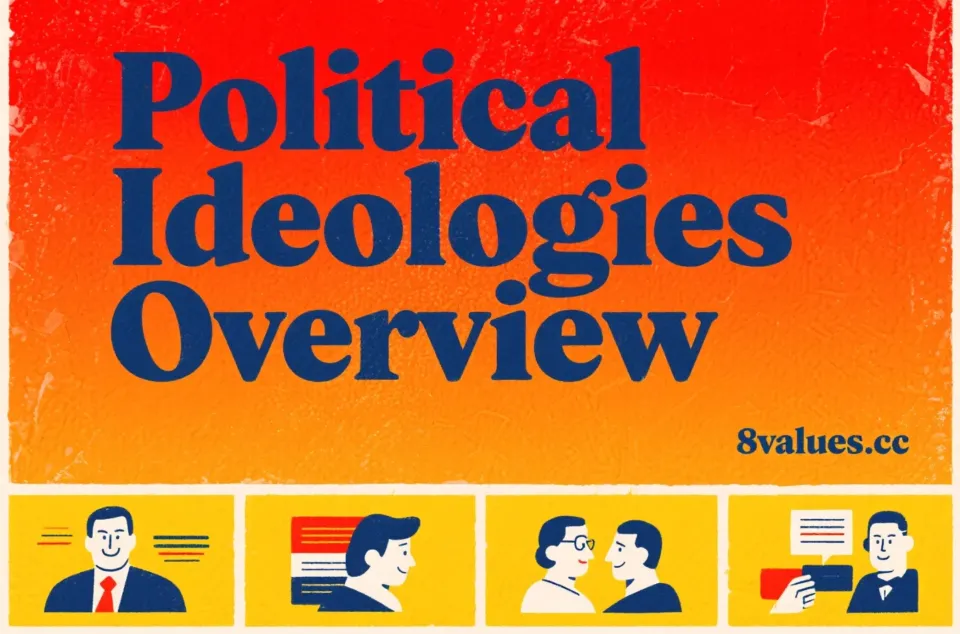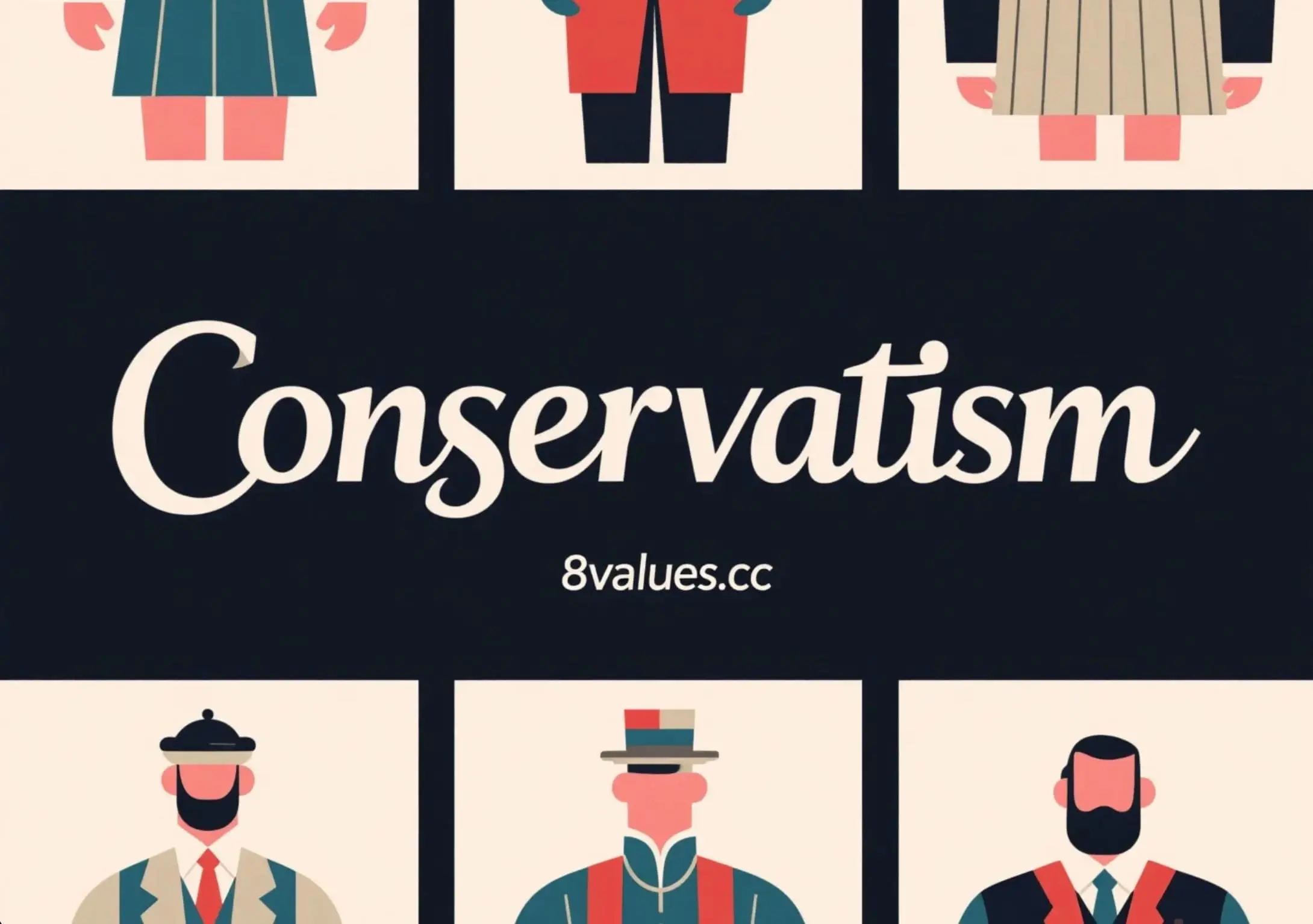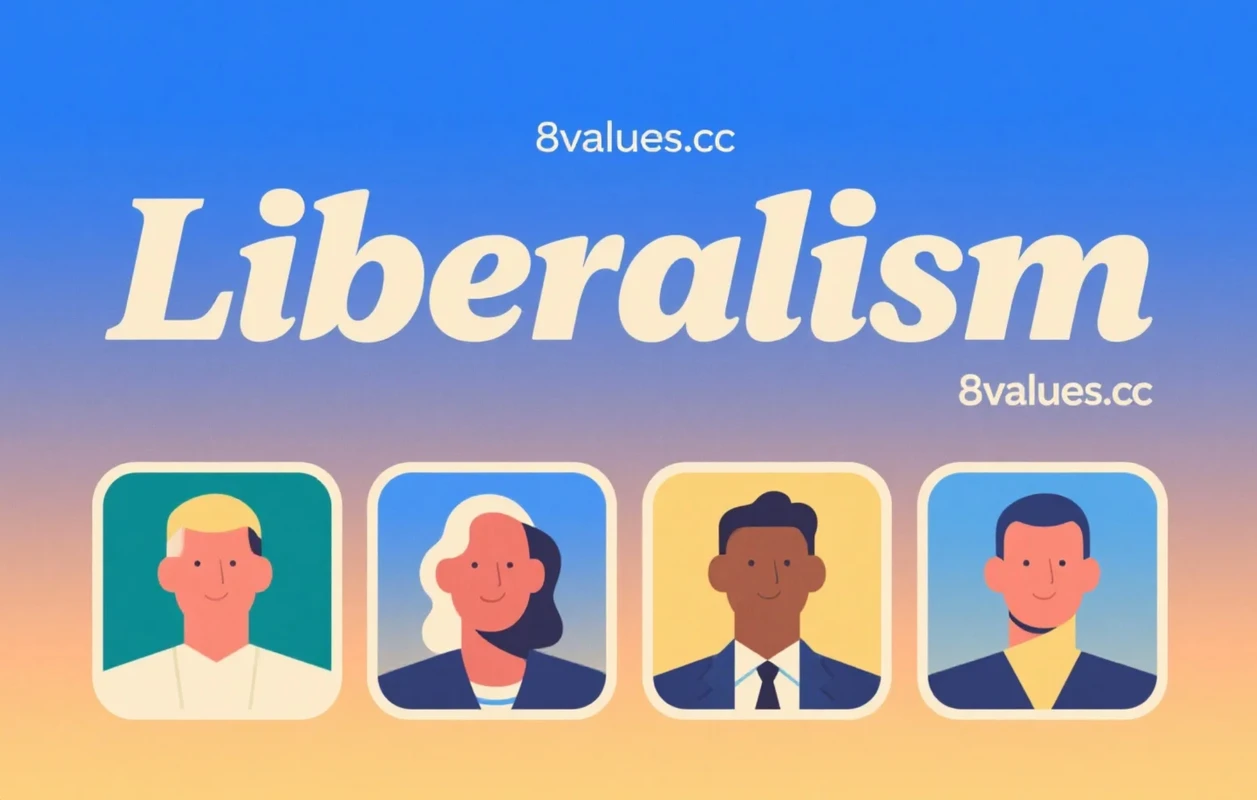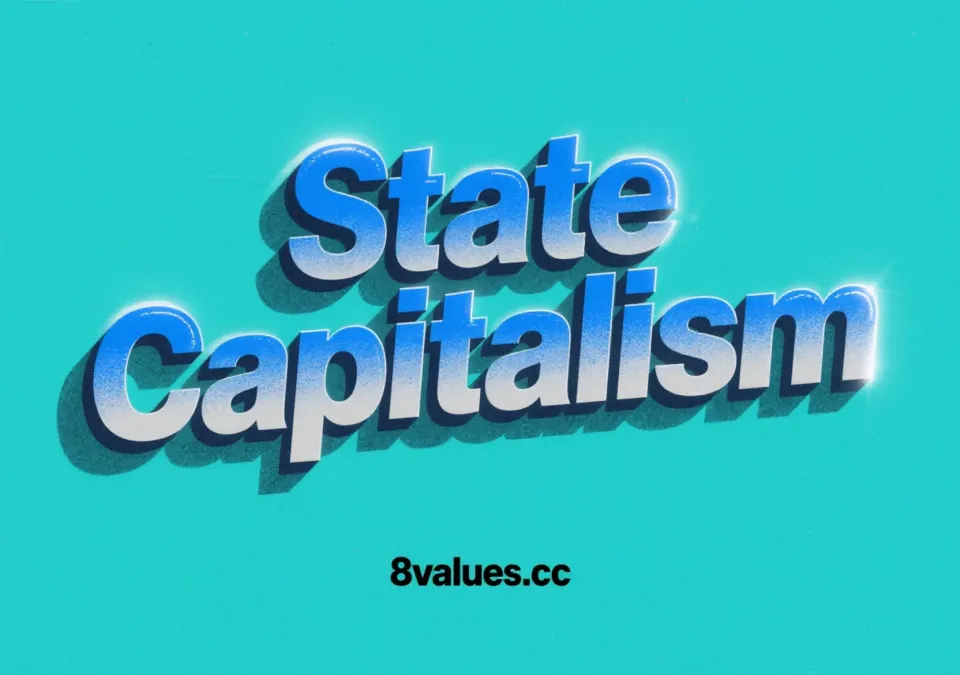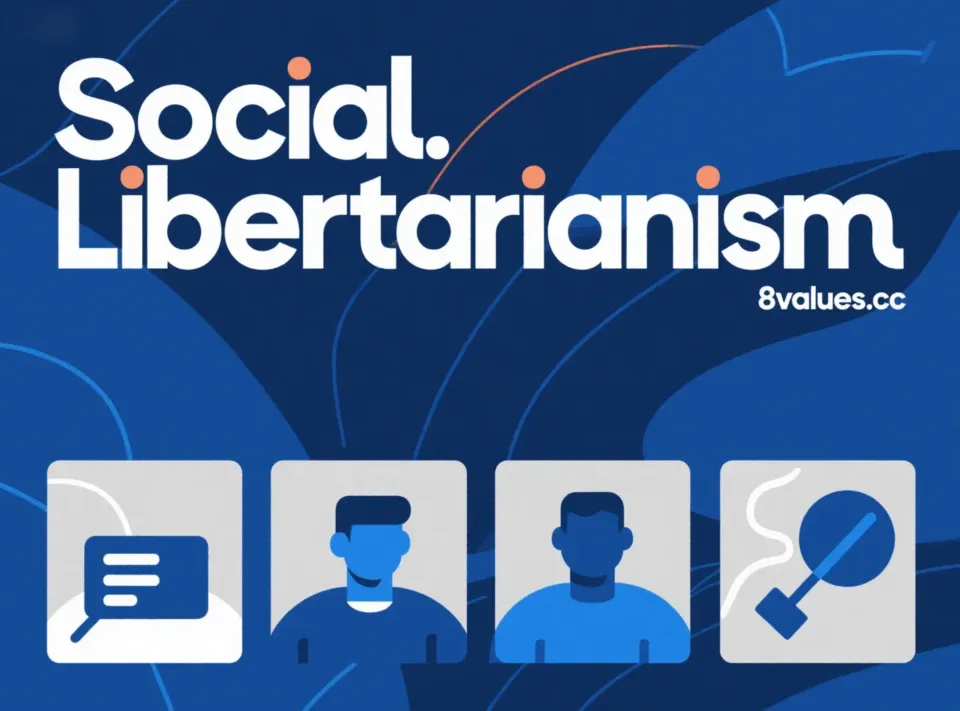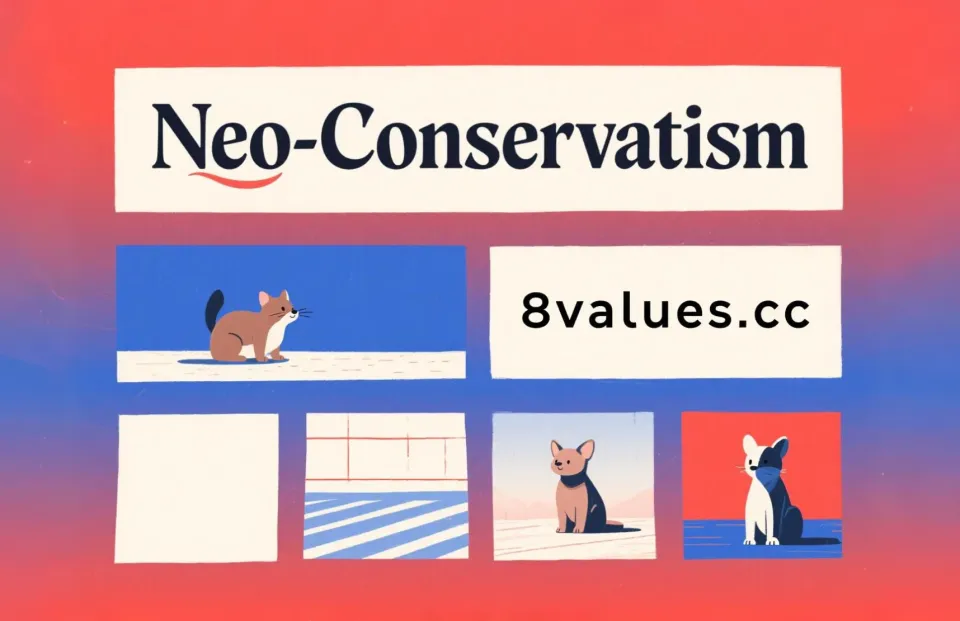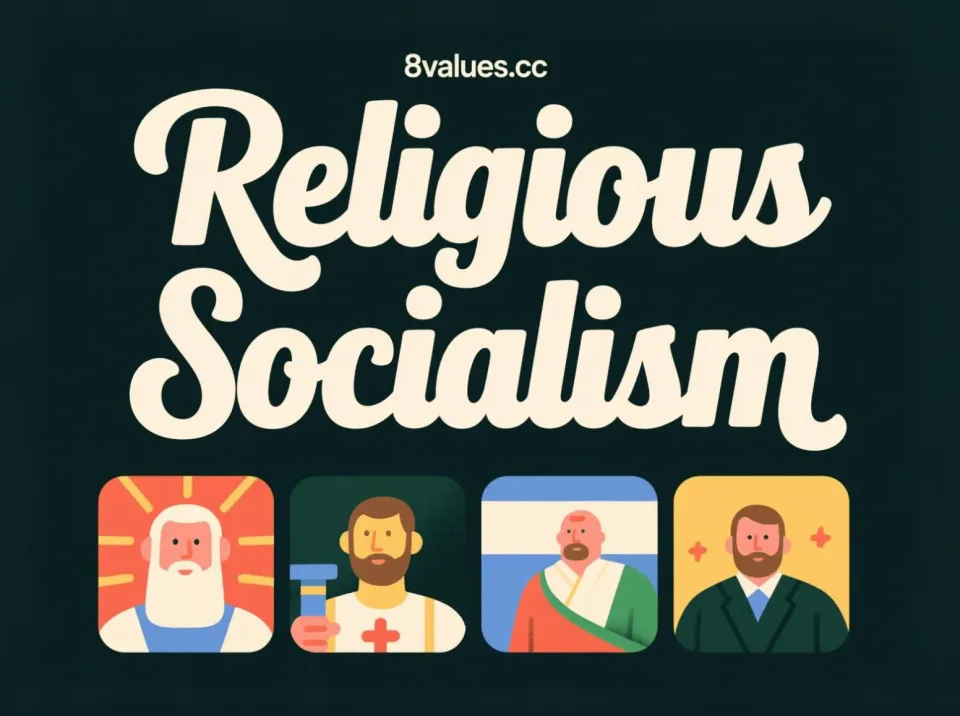Siyasi Düşünce Ansiklopedisi: Siyasi duruşunuzu nasıl bulabilirsiniz? Kapsamlı bir ideolojik rehber
Siyasi duruşunuzu tanımlamanıza ve anlamanıza yardımcı olmak için 50'den fazla siyasi ideolojiye ayrıntılı bir giriş sağlayarak, siyasi ideolojinin temel fikirlerini, tarihsel evrimini ve küresel politikalar üzerindeki etkisini derinden araştırın. 8 değer siyasi eğilim testimizi tamamlayın ve kendini keşfetme yolculuğuna çıkın.
Verdiğimiz siyasi kararların arkasındaki itici güç ve politikacılar tarafından alınan eylemler genellikle çeşitli siyasi ideolojilerden kaynaklanmaktadır. Amerika Birleşik Devletleri'nde, iki partili sistemi genellikle tartışmalara yol açar, ancak bu siyasi resmin buzdağının sadece görünen kısmıdır. Siyasi düşüncenin kapsamı, anarşik kapitalizmden liberalizme, demokratik sosyalizme kadar çeşitli ideolojileri kapsayan son derece geniştir.
Bu rehber, siyasi düşünce ve teorinin okyanusunu derinlemesine keşfetmeyi ve yerel siyaseti, ülke ve dünyayı şekillendiren farklı ideolojileri incelemeyi amaçlamaktadır. Siyasi ideoloji, bireylere ve politikacılara dünyayı nasıl gördüklerine ve toplumun ve hükümetin nasıl işlev görmesi gerektiğine inandıklarına rehberlik eden bir dizi inanç, görüş, değer veya doktrindir. Bu ideolojiler odaklarında büyük farklılıklar gösterir. Bazıları sosyal meselelere odaklanıyor ve devletlerin ve toplumların kişisel özgürlüğü ve medeni hakları nasıl yönettikleri konusunda bir plan sunuyor; Diğerleri ekonomik konulara odaklanır ve fonların ve emeğin nasıl kontrol edilmesi veya kontrol edilmesi gerektiğini açıklar. Nihayetinde, politik ideoloji sosyal, tarihsel ve kültürel bağlamları yansıtır, bu nedenle anlamı ve önemi zamanla değişecektir.
Uygulamada, siyasi ideoloji yasalarda, ekonomik yapılarda ve iktidar dağılımında takip ettiğimiz her şeyi etkiler. Çeşitli siyasi ideolojileri anlayarak, karmaşık siyasi ve hükümet yapısını daha iyi kontrol edebiliriz. Siyasi eğilimlerinizi merak ediyor musunuz? Siyasi yönelim testlerimize katılarak, değerlerinizin hangi ideoloji eşleştiği hakkında fikir sahibi olacaksınız.
Siyasi ideolojinin tam bir listesi
Tarih boyunca yüzlerce farklı siyasi ideolojiye, kimliklere, gruplara ve kamplara rağmen, bugünün dünyasında ve haberlerde en yaygın ve önde gelen ideolojilerin 50'sinden fazlasını topladık. Bu ideolojiler, feminizm ve çevre korumacılığı gibi belirli değerleri çevreleyen son kategoriye sahip 11 ana kategoriye ayrılmıştır. Bu kategorileri oluşturan özel ideolojiyi inceleyelim.
Anarşist siyasi ideoloji
Anarşizm Yunanca, "cetvel yok" anlamına geliyor . Basit sembollerin ötesine geçer ve bu varlıkların otoriter ve doğada kısıtlayıcı olduğunu savunan devlet gibi kurumlara karşı politik bir fikirdir. Birçok anarşist, vatansız bir toplumun kurulmasını savunuyor ve sağcı gruplar özel mülkiyeti destekleyebilir, ancak özel üretim araçlarının mülkiyetine karşı çıkıyor.
1. anarşik komünizm
Anarşik komünizm, anarşist düşünceyi komünist değerlerle birleştirir. Takipçileri hiyerarşiyi, sosyal sınıfı ve para birimini ortadan kaldırmaya inanıyor. Özel mülklere karşı çıkıyorlar ve toplu veya sosyal olarak sahip olunan mal, mal ve hizmetleri savunuyorlar. Bazı anarşik komünistler, kaynakları bireysel ihtiyaçlara göre ücretsiz olarak dağıtan bir "hediye ekonomisine" inanıyorlar.
2. Anarşik Kapitalizm
Bazen özgür irade anarşizmiyle karıştırılan anarşizm, hükümetin ve devlete ait kurumların özel kuruluşlarla değiştirilmesini savunur . Temel prensibi, toplumun kendi kendini düzenleyebileceği ve gönüllü mal ve hizmet alışverişi ve gerçek bir serbest pazar yoluyla toplumun gelişebileceği ve gelişebileceğidir. Ayrıca, anarşik kapitalistler, mahkemeler ve polis gibi kamu hizmetleri tarafından geleneksel olarak varsayılan rolleri yerine getirmek için özel işletmeleri ve kuruluşları kullanmaya inanıyorlar.
3. Klasik anarşizm
Klasik anarşizm, 19. ve 20. yüzyılın başlarında siyasi düşünürler tarafından kurulan anarşist düşüncenin temelidir. Bireysel özgürlük, otoriter karşıtı çabaların, mal ve hizmetlerin toplu sahipliği, toplumun sütunu olarak karşılıklı yardım, merkezi olmayan karar alma ve doğrudan eylem yoluyla hedeflere ulaşmaya odaklanmıştır.
4. Bireysel anarşizm
Bireysel anarşizm, bireyleri kolektifin üstüne yerleştirir. Bu fikirde, bireysel özerkliği ihlal ettiği için devlet kaldırılmalıdır. Bireysel anarşistler, insanların rasyonel aktörler olduğuna inanıyorlar ve mutlak kişisel egemenlik altında doğal düzen geçerli olacak, böylece istikrarlı ve uyumlu bir toplum yaratacaklar.
5. Dini anarşizm
Dini anarşizm dini uygulamaya göre değişse de, takipçileri genellikle Tanrı'nın, devletin ve hatta bazen örgütlü dinlerin müjdenin doktrinine aykırı olduğuna inanan tek gerçek otorite biçimi olduğuna inanmaktadır. Bazı dini anarşistler, Tanrı'nın iradesini takip ederek insanların evrensel sempati uygulayacakları, kendilerini yatay olarak örgütleyecekleri (otoriter sistemlerde dikey olarak organize olmaktan ziyade) ve dengeli bir toplum inşa edeceklerini kabul ediyorlar.
Otoriter siyasi ideoloji
Otoriterlik, özgürlük, bireysel haklar, hukukun üstünlüğü ve iktidarın ayrılmasını azaltan veya mahrum eden bir merkezileşme fikridir . Otoriter bir rejimin merkezi gücü bir siyasi parti, bir diktatör veya hükümdar veya bir askeri rejim tarafından kontrol edilebilir. Örneğin, Çin Halk Cumhuriyeti genellikle otoriter bir devlet olarak kabul edilir, çünkü son derece yüksek devlet gücü ve etkisi vardır.
1. Mutlak monarşi veya diktatörlük
Mutlak bir monarşi altında, tek bir kral, kraliçe veya diktatör devletin tam kontrolüne sahiptir. Mutlak monarşi diktatördür, yani hükümdar tek güç kaynağıdır ve bu güç genellikle ilahi olarak kabul edilir.
2. Emperyalizm
Genel olarak konuşursak, emperyalizm, diğer ülkeleri kontrol etmek için gücünü kullanan bir ülkenin uygulamasıdır. Birçok otoriter rejim emperyalizm yoluyla bir bölge içindeki kontrollerini genişletmiştir. Bazı emperyalistler, onlara “kaderi gösterme” fikri gibi iktidarı genişletme hakkı vermek için daha yüksek bir güç olduğuna inanabilirken, diğerleri emperyalizmi uluslarının uzun süreli varlığını sağlamanın bir yolu olarak görebilirler.
3. Oligarşi
Oligarşi, bir organizasyonu kontrol eden küçük bir grup insanı içerir . Oligarşik bir ülkede, küçük bir politikacı, iş adamı veya varlıklı bireyler, yasayı, ekonomiyi ve orduyu denetleyerek ülkenin tüm yönlerini kontrol ediyor.
4. Tek partili sistem
Tek partili bir devlette, siyasi bir grup hükümeti kontrol eder. Bazı tek partili sistemlerde, diğer tüm siyasi gruplar yasaklanır; Diğerleri diğer tarafların kontrollü bir şekilde katılmasına izin verir.
5. Teokratik Politika
Teokratik siyaset mutlak ve tüm gücü Tanrı'nın veya tanrıların ellerine koyar . Uygulamada, teokratik siyaset, dini liderlere Tanrı'nın iradesini siyasi karar almaya dönüştürmek için aracı olarak yönetme ve hareket etme hakkı verildiği mutlak bir monarşi olabilir. Teokraside dini özgürlük kesinlikle kısıtlanmıştır. Bazı teokratik devletler farklı dini uygulamaları tamamen yasaklarken, diğerleri sınırlı ve kontrollü dini özgürlüğe izin verebilir.
6. Totaliterisizm
Totaliterizm, otoriter hükümetin en aşırı ve nihai şeklidir . Totaliter devletlerde, güç oldukça yoğunlaşır ve halk devlete tam olarak itaat etmelidir.
Komünist siyasi ideoloji
Komünizm, topluluklara katılmanın bireyleri tanımladığına ve şekillendirdiğine inanarak toplulukları bireylere yerleştirir . Topluluğun ihtiyaçlarını karşılamak için genellikle küçük ve tarafsız olan sosyal bağlantıları ve sosyal uyumları vurgular. Sosyalist bir sistemdeki kuruluşlar ortak özellikler, tarih veya coğrafi konum etrafında oluşturulabilir.
1. Guild Toplumculuğu
İlk olarak eski Yunan filozofu Plato tarafından önerilen sisteme dayanarak, lonca toplulukçılığı, sanayi loncaları, mesleki dernekler ve kolektif işyerleri etrafında toplumu organize etmeyi içerir . Kariyer ve daha geniş topluluk hedefleri ve çıkarları bireyin üzerine ve sosyal uyum için çabalama çabaları yoluyla vurgulamaktadır.
2. Mülkiyet
Proleterizm ademi merkeziyetçiliği savunur, küçük veya yerel işletmeleri büyük şirketler üzerinde tercih eder ve kişisel mülkiyet haklarının ve üretim araçlarının yaygın kontrolünü destekler. Proleterlik bazen “üçüncü yol” un ekonomik bir sistemi olarak tanımlanır ve kapitalizm ve sosyalizmin dışında alternatif bir uzlaşmadır. Proleterler mülkiyet haklarını temel bir hak olarak görüyor ve üretken varlıkların devlet, şirket veya birkaç zengin insan tarafından değil, çoğunluğa sahip olması gerektiğine inanıyorlar.
3. Karşılıklı AIDISM
Karşılıklı yardım, ücretsiz bankacılık, serbest dernek, işyeri demokrasisi ve karşılıklı yardım yoluyla elde edilen sosyal destek ile karakterize edilen bir tür komünist ve anarşist fikirdir . Karşılıklı Aidizmin temeli, 1830'larda Amerikalı filozof ve sosyal reformcu Josiah Warren tarafından önerilen "maliyet fiyat sınırı teorisidir" dir. Teori, mal ve hizmetlerin maliyetinin, bunları üretmek için gereken kaynak ve emek miktarı ile sınırlı olması gerektiğini belirtir.
Komünist siyasi ideoloji
Komünist siyasi inancın özü, üretim araçlarının ortak mülkiyeti ve kaynakların toplumdaki herkesin ihtiyaçlarına göre tahsis edilmesidir . Komünizmde özel mülkiyet veya sosyal sınıf yoktur ve nihai amaç para birimini ve devleti ortadan kaldırmaktır. Uygulamada komünist ideolojiler büyük farklılıklar göstermektedir, ancak hepsi kapitalizmin sömürücü bir sosyal düzenin ortaya çıkmasına yol açtığı, toplumu iki sınıfa bölen inancını paylaşıyor: hayatta kalma için emeği satan proletarya ve proleter emekten kar elde eden burjuvazi.
1. Kışla Komünizm
Karl Marx, Sergei Nechayev'in gelecekteki sosyal düzen için vizyonunu eleştirirken "kışla komünizmi" terimini icat etti. Bu, insanların komün kuruluşlarına gönüllü olarak katılmayı seçmek yerine toplu olarak yaşamaya ve çalışmaya zorlandıkları otoriter bir sistemdir . Marx, bu sistemin öngördüğü sınıfsız ve gönüllü toplumun aksine, sosyalizmin otoriter ve zorunlu bir versiyonu olduğuna inanıyordu.
2. Marksizm
Karl Marx ve Friedrich Engels tarafından geliştirilen Marksizm, sosyo-ekonomik bir teori ve kapitalizm eleştirisi olarak tanımlanır . Marksistler, ekonomik sistemin sosyal yapıları şekillendirdiğine dair temel inancı paylaşıyorlar ve sömürüyü ortadan kaldırmak için üretim araçlarının toplu sahipliğini savunuyorlar.
3. Leninizm
Leninizm, Vladimir Lenin tarafından Karl Marx'ın düşüncesi temelinde kurulan politik bir ideolojidir . Leninism, profesyonel bir devrimci partinin olması gerektiğine inanıyor. Bu parti, proleter işçi sınıfının devrim yaratmasına ve kapitalizm ve burjuva baskısından kurtulmasına yol açacaktır. Ayrıca, Leninizmin temel bir yönü, sınıfsız ve tamamen komünist bir topluma geçişi teşvik etmek için bir geçiş devletinin kurulmasıdır.
4. Mao Zedong Düşünce
Marksizm-Leninizm'in bir biçimi olarak Mao Zedong, Leninizm'in proleter işçi sınıfına yaptığı vurgu yerine, devrimde tarımsal ve köylü sınıfının rolünü vurgulamaktadır . Mao Zedong düşünceleri, bürokratik elitlerin kontrolü yeniden kazanmasını ve tamamen komünist sosyal hedeflere doğru ivme kazanmasını önlemek için devam eden devrimlerin gerekli olduğuna inanıyordu.
Muhafazakar siyasi ideoloji
Muhafazakar ideoloji genellikle hükümetin ekonomiyi ve işletmelerin düzenlenmesinde daha az bir rolü olduğunu savunmaktadır . Buna ek olarak, birçok muhafazakar siyasi savunucu geleneksel sistemlerin, geleneklerin ve değerlerin korunmasını gerektirir. Batı'da, bazı muhafazakar ideolojiler, çekirdek aileler, mülkiyet hakları, hukukun üstünlüğü ve organize din gibi kültürel ve politik sistemlerin hizmetini ve korunmasını teşvik edebilir.
1. otoriter muhafazakarlık
Otoriter muhafazakarlık, geleneksel muhafazakar idealleri merkezileştirme ile birleştirerek ulusal birlik ve yasal düzeni bireysel özgürlük veya demokrasi gibi daha liberal ideallerin üzerine koyar . Otoriter muhafazakarlık, otoriter müdahale yoluyla yerleşik sosyal yapıları sürdürmeyi ve siyasi muhalefeti sınırlamayı amaçlamaktadır.
2. Alternatif sağ kanat hareketi
Alt-sağ , milliyetçiliği ve popülizmi teşvik etmek ve ana akım Batı muhafazakarlığına karşı olan nispeten yeni bir siyasi ideolojik grup grubudur. Alt-sağ çok kültürlülüğü reddeder ve siyasi doğruluk veya “uyanış kültürü” ile ilgili herhangi bir eyleme veya organizasyona karşıdır.
3. Klasik muhafazakarlık
Klasik muhafazakarlık, muhafazakar ideolojinin temel inançlarını kapsar ve radikal reformdan ziyade geleneksel ve kademeli değişimi teşvik eder. Klasik muhafazakarlığı destekleyenler genellikle yerleşik gümrükleri ve ahlaki değerleri destekler ve tarihe geleneksel saygıyı teşvik ederler.
4. Mali muhafazakarlık
Mali muhafazakarlık, ekonomi politikalarına odaklanır, hükümet harcamalarını sınırlandıran, bireyler ve işletmeler için vergileri azaltmayı ve kamu borcunu azaltmayı savunur . Mali muhafazakarlık, serbest piyasalara, bütçe dengesine ve hükümet ekonomik faaliyetlerine sınırlı katılım, refahtan ziyade özel sektör çözümleri gibi kamu hizmetlerini teşvik eder.
5. Yeni Milliyetçilik
Yeni milliyetçilik, 20. yüzyılın sonunda küreselleşmeden memnuniyetsizlikten kaynaklanan gerici bir ideolojidir. Yeni milliyetçiliğin temel değerleri, yeni milliyetçilerin sosyal istikrarı korumak için araçlar olarak kullandığını savundukları geleneksel dini inançlar, milliyetçilik ve miras etrafında dönüyor . Yeni milliyetçiler genellikle modern ve ilerici sosyal değişimi reddeder ve bunu geleneksel değerler, normlar ve kurumlar için bir tehdit olarak görürler.
6. Neoconservatizm
Neoconservatizm, 1960'larda Amerika Birleşik Devletleri'nde başladı, müdahaleci dış politikayı savunarak, askeri güçler aracılığıyla denizaşırı demokrasiyi teşvik etmeyi ve ABD'nin küresel etkisini geliştirmeyi amaçladı . Neo -muhafazakar Cumhuriyet Cumhurbaşkanı George W. Bush'un yönetimi sırasında, neo -muhafazakarlığın siyasi etkisi büyüdü, Amerikan istisnasını destekledi ve Irak savaşında önemli bir rol oynadı.
7. Eski Muhafazakarlık
Eski muhafazakarlar geleneksel değerleri korumaya odaklanıyor. Bu ideoloji, müdahaleci olmayan veya izolasyonist konumu ile diğer modern muhafazakar hareketlerden ayırt edilir . Eski muhafazakarlık anti-globalizm, anti-modernizm ve göçmenlik konusunda şüphecidir. Amerika Birleşik Devletleri'nde, eski muhafazakarlar milliyetçiliği, Hıristiyan etiğini ve çok kültürlü indirgeme programlarını savunmaktadır. Bazı eski muhafazakarlar sosyal inançlarını ırk veya kimlik politikası konularına odaklayabilir.
8. İlerici muhafazakarlık
İlerici muhafazakarlık, insani ve çevre meseleleri gibi alanlara hükümet müdahalesini teşvik ederken kapitalist ekonomiyi desteklemektedir . Theodore Roosevelt ve Angela Merkel gibi ünlü figürler ilerici muhafazakar olarak tanımlanmış veya ilerici muhafazakar politikaları savunmaktadır. Özünde, ilerici muhafazakarlar kapitalist sistemi korumaya çalışırlar, ancak insan ve çevresel sorunları çözmek için devlet eyleminin gerekli olduğuna inanmaktadır.
9. Teokratik muhafazakarlık
Eski ve neokonsavatizm ile birçok benzerliği olsa da, teokratik muhafazakarlık muhafazakarlık ve dini köktendinciliğin bir kombinasyonudur . Dini devletleri vurgular ve dinin siyasi ve sosyal normlardaki etkisini savunur. Teokratik muhafazakarlar da dinlerinden ahlaki değerler kazanırlar.
Faşist siyasi ideoloji
Faşizm aşırı sağ, aşırı milliyetçi, otoriter bir siyasi ideolojidir . Genellikle otoriter veya diğer otoriter hükümetleri içerir, tüm muhalefet gruplarının bastırılmasını zorlar, doğal sosyal hiyerarşileri savunur ve bireysel hakları ve çıkarları devletin, belirli bir ırk veya siyasi partinin yararına kınamaktadır. Faşizm öncelikle Nazi Almanya'nın siyasi sistemi ile ilişkili olsa da, ilk faşist hareket I. Dünya Savaşı sırasında İtalya'da başladı, daha sonra faşist ideoloji çeşitli siyasi partileri ve hükümetleri etkiledi.
1. Hıristiyan faşizmi
Hıristiyan faşizmi veya Hıristiyan faşizmi, faşist ilkeleri dini kimlikle birleştiren bir ideolojidir . Otoriter gündemi savunmak için genellikle dini dogmayı kullanır. Devlette dini değerleri koruma politikasını savunur ve muhalefeti varoluşsal bir tehdit olarak inanır.
2. Nazizm
Nazizm, 20. yüzyılın başlarında, otoriter hükümetin yapısı, aşırı milliyetçilik ve anti-Semitizme destek ile karakterize edilen Adolf Hitler Ulusal Sosyalist Partisi'nin siyasi ideolojisidir. Irksal üstünlüğü teşvik eder ve çoğu zaman şiddetli araçlar kullanarak öjenikler aracılığıyla daha saf bir ulusun yaratılmasını savunur.
3. Neofascizm
II. Dünya Savaşı'ndan sonra ortaya çıkan neofasizm aşırı sağ politik bir ideolojiydi . Nativizm, göçmen karşıtı duygu, aşırı muhafazakarlık, ırksal üstünlük ve sosyalizm veya komünizm gibi aşırı sol hareketlere yaygın bir muhalefet dahil olmak üzere orijinal faşist hareketle birçok benzerliğe sahiptir. Adından da anlaşılacağı gibi, Neofascizm geleneksel faşist ilkeleri küreselleşme ve çok kültürlülük gibi modern zorluklara uyarlar.
Liberal siyasi ideoloji
Liberalizm, bu hakları herkes için güvence altına almak için hükümetin kullanımını savunurken bireysel hak ve özgürlükleri korumaya kararlıdır . Liberaller geleneksel olarak hükümet müdahalesini daha adil ekonomik sonuçlar yaratmak, sosyal refahı teşvik etmek ve eğitim, yoksulluk ve sağlık hizmetleri gibi konuları ele almak için desteklediler.
1. klasik liberalizm
Klasik liberalizm ve diğer liberal düşünme biçimleri arasındaki fark, laissez-faire serbest piyasa ekonomisini savunmasıdır . Bununla birlikte, devletin ekonomiye müdahale etmesini istememesine rağmen, klasik liberaller hükümetin sosyal yaşam ve refahın bazı yönlerinde, kolluk kuvvetleri, sağlık ve eğitim gibi gerekli olduğuna inanmaktadır.
2. Muhafazakar liberalizm
Muhafazakar liberalizm genellikle ekonomik sistemlerdeki liberal görüşleri ahlaki veya sosyal konularda muhafazakar konumlarla birleştirir . Muhafazakar liberaller, sosyo-ekonomik faaliyetler üzerindeki klasik liberal laissez-faire tutumlarını ve hükümet kısıtlamalarını kabul eder, ancak aynı zamanda toplumdaki daha geleneksel değerleri de savunurlar.
3. Laik Liberalizm
Laik liberalizm, hükümetin dinden ayrılmayı inançlarının merkezine yerleştirerek din dışı etiği ve laik değerleri teşvik eder . Sosyal örgütler için laik liberalizm genellikle liberal demokrasi ve ahlaki evrenselcilik ilkelerine bağlıdır.
4. Sosyal liberalizm
Sosyal liberalizm en iyi klasik liberalizmle karşılaştırıldığında: Sosyal Liberalizm, klasik liberalizm tarafından savunulan sınırlı hükümeti ve laissez-faire ekonomisini savunmaz, ancak karışık bir ekonomiyi destekler ve hükümeti medeni ve siyasi hakları, sosyal adaletleri geliştirmek ve sosyal hizmetleri geliştirmek için vazgeçilmez bir araç olarak görür .
Liberalizm siyasi ideoloji
Liberterizm, özgürlük ve hakları diğer tüm değerlerin üzerine koyarak karakterize edilir . Birçok liberal ideolojinin temel ilkesi, başkalarının yaşamlarını veya haklarını ihlal etmediği veya ihlal etmediği sürece herkesin yaşayabilmesidir. Genel olarak konuşursak, liberaller otoriter devletlere, milliyetçiliğe ve müdahaleci politikalara karşı çıkıyorlar.
1. Sonuç odaklı liberalizm
Sonuçlara yönelik liberalizm, serbest piyasaların yaratılması ve yürütülmesi ve özel mülkiyetin korunması gibi devlet davranışlarının maliyet-fayda analizinden kaynaklanmaktadır . Sonuç odaklı bir bakış açısına sahip olan liberterler, güç ve verimlilik gibi olumlu sonuçlar yarattıkları için, güç kullanımını veya belirli hakların ihlalini içerseler bile, bu devlet eylemlerinin kabul edilebilir olduğuna inanmaktadır.
2. Kurumsal oligarşi
Kurumsal oligarşide, federal hükümetin son derece sınırlı bir gücü vardır ve çoğu hükümet işlevi şirket ve ticari çıkarları tarafından yönetilir veya ciddi şekilde etkilenir . Kurumsal oligarşi, liberalizmin özelleştirme ilkeleri aşırı uçlara itildiğinde ortaya çıkabilir. Kurumsal temelli oligarşi, sadece son derece zengin insanların siyasi etkiye ve yasal haklara sahip olduğu oligarşi veya chaebolizm gibi otoriterliğe dönüşebilir.
3. sol kanat liberalizm
Sol kanat liberalizm, bireysel özgürlük ve sosyal eşitliğe olan inancı olarak tanımlanır . Tipik olarak, sol kanat liberal Willistleri, kişisel mülkiyet haklarının korunmasını sürdürürken kolektif mülkiyeti ve doğal kaynakların (arazi gibi) adil dağılımını savunurlar. Solcu liberterlerin çoğu devlet refahı programlarını desteklemekte ve devletlerin kaynakların yeniden dağıtılmasını kontrol etmesi gerektiğine inanmaktadır.
4. Sağcı liberalizm
Esas olarak , özgür irade kapitalizmi olarak da bilinen sağcı liberalizm olan sol kanat liberalizminin aksine, serbest piyasayı servet ve mülkü dağıtmak için ideal yöntem olarak görüyor . Sağcı liberalistler geleneksel liberalist bireysel sosyal hakları destekler, ancak kapitalist bir ekonomik sistemi benimserler.
Popülist siyasi ideoloji
Popülizm, seçkin gruplar olarak görülmek yerine genel nüfusu geliştirmek için tasarlanmış bir dizi siyasi teori ve fikirdir . Farklı popülistler ve popülist hareketlerin farklı “sıradan insanlar” ve “seçkinler” tanımları vardır ve siyasi yelpazede hemen hemen her konumda popülistler vardır.
1. Tarımcılık
Tarımcılık, sanayileşme ve kentsel modernizasyondan ziyade tarımsal ve kırsal yaşam tarzlarını destekleyerek karakterizedir . Tarımcılık, şehirlerin yükselişine, sanayileşmeye ve merkezi hükümetin oluşumuna karşı çıkarken oluşan doğada gericidir. Tarımsallık destekçileri, merkezi olmayan siyaseti teşvik eder, küçük sahip haklarını ve sürdürülebilirliği, geniş mülkiyet haklarını ve kırsal alanlarda kalkınmayı geliştirir.
2. Muhafazakar popülizm
Sağcı popülizm veya ulusal popülizm olarak da bilinen muhafazakar popülizm, muhafazakar idealleri ve değerleri popülist mesajlarla harmanlıyor . Muhafazakar popülistler anti-elitlerdir ve "védélic çıkarları" olarak gördükleri şeye karşıdır.
3. sol kanatlı popülizm
Sol kanat popülizm veya sosyal popülizm, muhafazakar popülizmin karşısında siyasi yelpazenin diğer tarafında yer almaktadır. Klasik sol siyaseti ve değerleri kuruluş karşıtı, anti-elitizm gibi popülist mesajlarla birleştirir ve sıradan insanları temsil etme ve oluşma iddiaları.
İlerici siyasi ideoloji
İlerlemeciliğin temel amacı, sosyal reformlar ve teknoloji, sosyal organizasyonlar ve bilimdeki ilerlemeler yoluyla insan durumunu iyileştirmektir . Geleneksel olarak sol eğilimli bir siyasi ideoloji olarak, ilerlemecilik insan haklarının korunmasını savunur, kapitalizmi düzenler ve kültürel kalkınmayı teşvik etmek için politikaları teşvik eder.
1. Kültürel ilerlemecilik
Kültürel ilerlemecilik, bireysel hakları, kapsayıcılığı ve eşitliği teşvik eden sosyal değişimi savunmaktadır . Bazı kültürel ilerleyicilerin ekonomi politikası konusunda anlaşmazlıkları olsa da, genellikle çevre sorunlarını, ırksal adalet ve cinsiyet eşitliğini ele almak için ilerici reformlar benimsemeyi kabul ederler. Kültürel ilericiler genellikle çok kültürlülüğü, sosyal adalet girişimlerini ve laikliği benimser.
2. Ekonomik ilerlemecılık
Ekonomik ilericiler, sınırsız kapitalizmin haksız ekonomik koşulların ve servetin eşit olmayan dağılımının nedeni olduğuna inanmaktadır . Piyasa kontrolü ve düzenlemesi yoluyla yukarı doğru likiditenin gelişebileceğine ve gelir eşitsizliğinin azalacağına inanıyorlar. Ekonomik ilerleyenler, antitröst yasaları, ticaret ve sendikaların teşvik edilmesi ve asgari ücret yasalarının iyileştirilmesi gibi belirli politikaları savunabilir.
3. Teknolojik ilerlemecilik
Teknolojik ilerlemecilik, teknolojiyi daha adil ve sürdürülebilir bir topluma ulaşmanın birincil yolu olarak görüyor . Teknolojik inovasyon yoluyla, bilimsel ve teknolojik ilericiler sosyal sorunların çözülebileceğine ve yaşam kalitesinin geliştirilebileceğine inanmaktadır. Bununla birlikte, teknoloji ilerlemeleri, teknolojinin insanlara ve topluma fayda sağlamak ve inovasyon ve sonuçların adil bir şekilde dağıtılmasını sağlamak için kullanıldığından emin olmak için düzenlemelerin ve politikaların oluşturulmasını savunmaktadır.
Sosyalist siyasi ideoloji
Sosyalizm, üretim araçlarının sosyal mülkiyeti olarak tanımlanır, yani topluluklar, kolektifler, çalışanlar veya genel halk gibi daha geniş bir grup, şirketler veya işletmeler yerine mal ve hizmet üretimini kontrol eder . Sosyalist ideoloji genellikle nihai hedefi kabul eder, ancak bazı devrimci eylemleri savunmak için bunu başarma stratejilerinde farklılık gösterirken, diğerleri daha küçük sosyal ve ekonomik değişiklikler yoluyla daha kademeli bir yaklaşım seçer.
1. otoriter sosyalizm
Bazen "yukarıdan aşağıya sosyalizm" olarak adlandırılan otoriter sosyalizm, sosyalist ekonomi politikalarını teşvik ederken siyasi partiler üzerinde merkezi kontrolü sürdürür . Genellikle, sosyalist toplumların karşı-devrimci veya zorla yukarıdan aşağıya kurulmasını önlemek için ifade özgürlüğü ve toplanma özgürlüğü gibi özgürlükleri kısıtlar.
2. Demokratik Sosyalizm
Demokratik sosyalistler sosyal sahiplik ekonomisini ve siyasi demokrasiyi savunuyorlar . Demokratik bir sosyalist sistemde, hem siyasi hem de ekonomik kararlar referandumlar yoluyla alınır ve işçiler iş organizasyonlarını ve işyerlerini yönetir. Demokratik sosyalizm, devletin bu değişiklikleri demokratik yollarla uygulaması gerektiğine inanmaktadır.
3. Liberal Sosyalizm
Liberal sosyalizm, liberal ideallerin ve sosyalist uygulamaların bir kombinasyonudur. Liberalizmi insan özgürlüğünün politik bir ifadesi olarak görür ve sosyalist yöntemin insan yaşamının mutlak özgürlüğü için koşullar yaratabileceğine inanır . Uygulamada, liberal sosyalistler, işçilerin kontrolündeki endüstriler ve özel işletmeler de dahil olmak üzere karma bir ekonomiyi destekliyor ve özgürlüğü toplu sahiplik ile dengeliyorlar.
4. Sosyalizm reformu
Sosyalizm reformu, toplumsal, siyaset ve ekonomideki sosyalist değişikliklerin mevcut kurumlarda kademeli değişikliklerle gerçekleştirilebileceği bir ideolojidir . Reform Sosyalistler devrimci eylemleri savunmaz, ancak mevcut yasama ve kurumsal yollarla toplumu yeniden şekillendirmeye odaklanırlar.
5. Devrimci Sosyalizm
Devrimci Sosyalizm, toplum, siyaset ve ekonomideki temel sosyalist değişikliklerin ancak devrimci eylemlerle gerçekleştirilebileceğine inanmaktadır . Sadece kapitalizmi ve mevcut kurumları devirerek gerçekten sosyalist bir toplumun kurulabileceğine inanarak kademeli reformları reddettiler.
6. Sendromizm
Sendromizm, çekirdeği sendikaların ellerine kontrol ve üretim araçlarının sahipliğini yerleştirmek olan sosyalist bir hareket ve ideolojidir . Sendromistler, grevler ve diğer protesto biçimleri gibi doğrudan eylemlerle işçilerin ihtiyaçlarını ve haklarını teşvik etmeye inanıyorlar.
Diğer siyasi ideoloji biçimleri
Birçok siyasi ideoloji ekonomik veya sosyal örgütler üzerine inşa edilirken, bazıları daha spesifiktir, tek bir düşünceye veya bireysel kimliğe odaklanır. Bazen bu ideolojiler daha büyük gruplarla birleştirilebilir ve daha spesifik ideolojilerin takipçileri diğer geleneksel politik felsefe türleriyle de özdeşleşebilir.
Belirli kimliklere ve fikirlere odaklanan bazı yaygın siyasi ideolojiler şunları içerir:
- Hayvan Hakları Hareketi : Toplum ve İşçi'de Hayvan Refahı Politikalarını teşvik etmek için siyasi savunuculuk.
- Çevre Korumaizm : Çevre Koruma ve Bakımına odaklanan sosyal ve politik bir hareket; Genellikle sürdürülebilir politikaları savunur, ekosistemler üzerindeki insan etkisini azaltır ve doğal kaynakları korur.
- Feminizm : Kadın haklarını ve cinsiyet eşitliğini teşvik etmek isteyen bir dizi sosyo-ekonomik ideoloji.
- Ayrılık : Belirli bir grubun daha büyük bir gruptan tam bir siyasi ayrılmasını savunan bir ideoloji; Ayrılıkçı gruplar genellikle daha büyük bir toplulukla entegrasyonun, kendi kaderini tayin etme ve kendini gerçekleştirme yeteneklerini zayıflatacağına inanırlar.
- Teknolojik bürokrasi : Seçilmiş politikacılardan ziyade teknoloji uzmanlarına karar verme gücü verme inancı.
- Transhümanizm : İnsan durumunu iyileştirmek, ömrü uzatmak ve insan kapasitesini arttırmak için teknolojinin kullanımını savunan bir ideoloji.
Siyasi ideolojik modelin özeti
Sonuçta, siyasi ideoloji dünyayı, soldan sağa ve aradaki her şeyi nasıl gördüğümüzü şekillendiriyor . Amerika Birleşik Devletleri'nde, iki partili sistem genellikle geniş siyasi inançları basitleştirir, ancak ideoloji Demokratlardan ve Cumhuriyetçilerden çok daha basittir. Siyasi fikirlerin çeşitliliğini anlamak, tartışmalara daha düşünceli katılmamızı, daha dikkatli oy kullanmamızı ve hükümetin karmaşıklığını daha iyi anlamamızı sağlar. İster liberalizm, ister sosyalizm veya tamamen farklı fikirler olsun, bu ideolojileri keşfetmek, dünyayı şekillendiren politikaları ve eylemleri anlamamız için daha net bir bakış açısı sağlayabilir.
Kendi siyasi eğilimlerinizin ve değerlerinizin en çok yukarıdaki ideolojiden hangisi olup olmadığını bilmek ister misiniz? Siyasi duruşunuzu keşfetmenize yardımcı olmak için tasarlanmış ücretsiz 8 değer siyasi yönelim testleri sunuyoruz. Ayrıca, çok çeşitli ideolojilere ayrıntılı tanıtımlar hakkında bilgi edinmek ve siyasi ufuklarınızı genişletmek için resmi blogumuzu ve 8 değeri tüm sonuç ideoloji sayfasını ziyaret edebilirsiniz!
